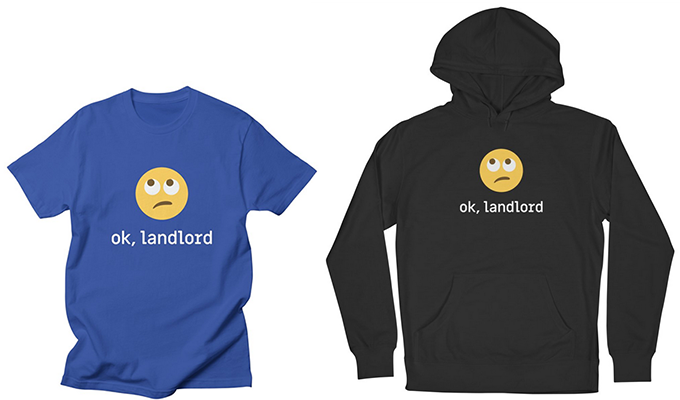OK, Landlord: If Copyright Supporters Are Going To Insist Copyright Is Property, Why Are They So Mad About Being Called Landlords?
from the copyright-is-funny dept
After writing this post, we realized that the phrase would make a great t-shirt! So now you can get yourself some OK, Landlord gear from the Techdirt store on Threadless »
For a long time now we've explained why comparing copyrights to property is fraught with problems. So much of the reason that we engage in property rights is to enable a more efficient allocation of scarce goods. When you have something that is not-scarce -- or as the cool economist kids like to say "non-rivalrous and non-excludable" -- treating them in the same manner as if they were scarce creates all sorts of weird problems, many of which we've spent two decades detailing on this site. Indeed, for every argument made that copyright is property, you could make a compelling case that it's actually the opposite of property in that it frequently takes away the rights and ability of individuals to do what they want with products they rightfully own.
Five years ago, I noted that one of the big problems around the concept of "intellectual property" was the failure of people to separate the content, from the exclusive rights. That is, it's fair to think of the copyright as a form of property -- as the "right of exclusion" that it creates is more property-like -- but that it must be seen as separate from the underlying content. The "copyright" is not the content. And so much of the discussion around copyrights conflates the right and the underlying content and that creates all sorts of problems.
Meanwhile, law professor Brian Frye has spent the last month or so making a really important point regarding the never-ending "is copyright property" debate -- saying that if copyright is property, then copyright holders should be seen and treated as landlords. This whole approach can be summed up in the slightly snarky and trollish phrase: "OK, Landlord" used to respond to all sorts of nonsensical takes in support of more egregious copyright policies:
Like everyone, the copyright cops want to have their cake and eat it too. They claim that copyright is a kind of property, so the law should protect it just like any other kind of property. But they also claim that authors are morally entitled to copyright ownership because of their special contribution to society. I find both claims uncompelling, but in any case, they can’t have it both ways. If copyright is a property right, they have to own it and can’t claim the moral high ground.
What's been most telling about this useful analogy is just how angry it seems to make copyright holders and copyright-system supporters. They react very negatively to the suggestion that they are "landlords" and any money they make from copyright licensing is a form of "rent." But if you're going to claim that your copyright is profit, then, well, the landlord moniker fits.
But the copyright cops persist, insisting that copyright is property, so copyright owners are entitled to the entire value of the works they create because that’s what property means. Accordingly, copying a work of authorship without permission is theft, even though it only increases the number of copies, because the copyright owner didn’t profit. And even consuming a work of authorship without permission is wrong because copyright owners are entitled to profit from every use of the work they own.
The circularity of these claims should be obvious: copyright is property because copyright owners receive exclusive rights, and copyright owners receive exclusive rights because copyright is property. But let’s run with it. Okay, copyright is property and copyright owners are property owners. Why are copyright owners entitled to profit from the use of their property?
Because they’re landlords. Copyright owners want to own the property metaphor? Then, let ‘em own it. If copyright is property, then they are landlords and copyright profits are rent. Just like landlords, copyright owners simply make a capital investment in creating or acquiring a property, then sit back and wait for the profits to roll in.
As Frye notes, the whole idea that copyright holders are landlords (even as they claim that they are holding property that you need to pay them to use), shows the sort of emotional trickery that copyright holders use in also claiming some sort of moral right to their works as "creators." They're picking and choosing which arguments to use when -- and, have long tried to imbue some sort of magical mystical status on holding the copyright to creativity (which is often quite different than creating itself).
Of course, the real issue at play is that many of the most vocal copyright system supporters want to believe that they're "artists" who are fighting the system and speaking for the oppressed... and being a "landlord" who is renting out their property goes against that self-image. But as Frye notes, they can't really have it both ways. If they want to declare that they have property rights, they should be perfectly find with recognizing that they are the current landlords for that "property."
Want to irritate the next copyright holder you meet? Then get yourself an OK, Landlord t-shirt (or hoodie, or button, or notebook, or...) from the Techdirt store on Threadless »
Filed Under: brian frye, copyright, intellectual property, monopoly rents, ok landlord, property rights, rents


